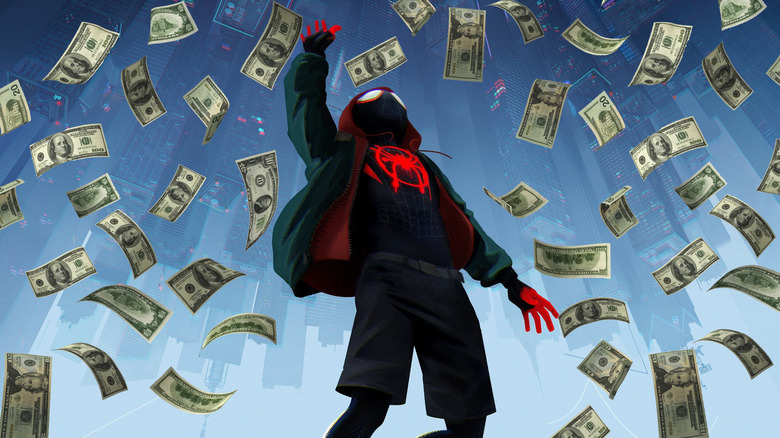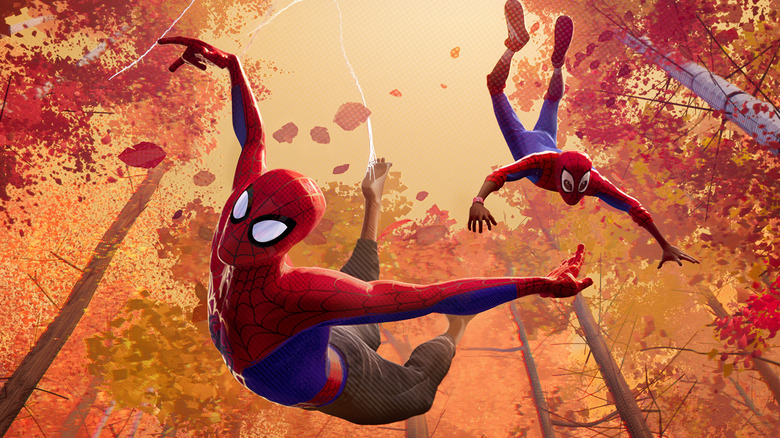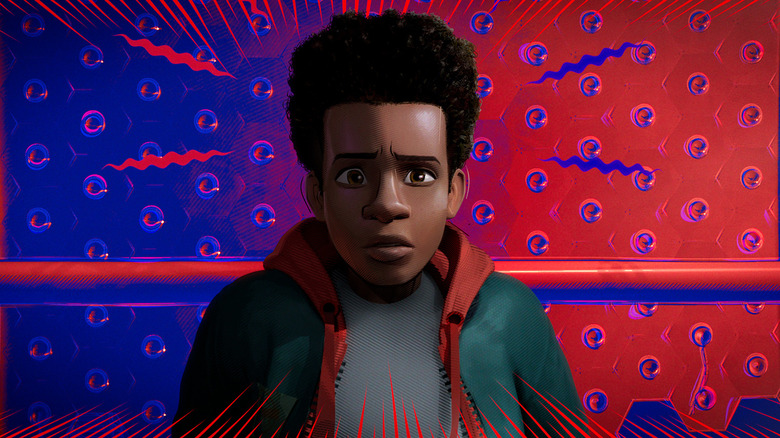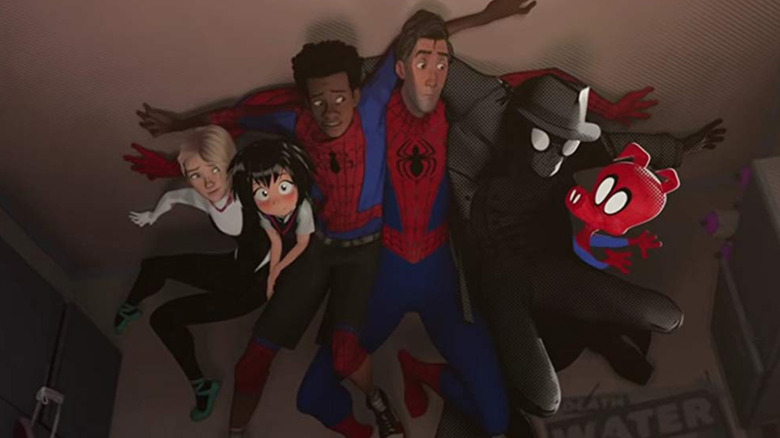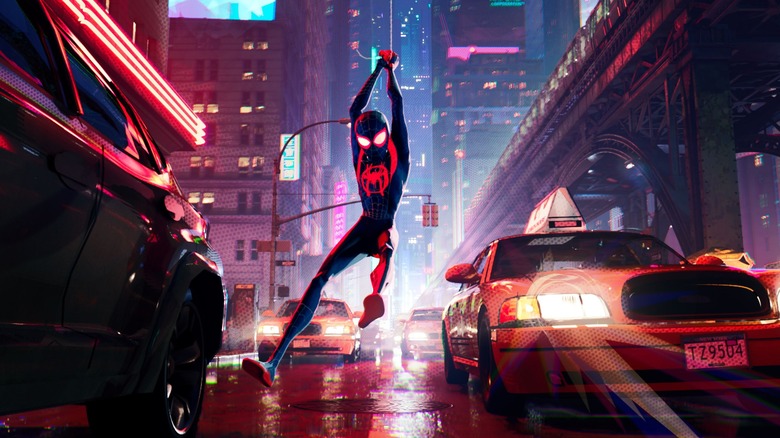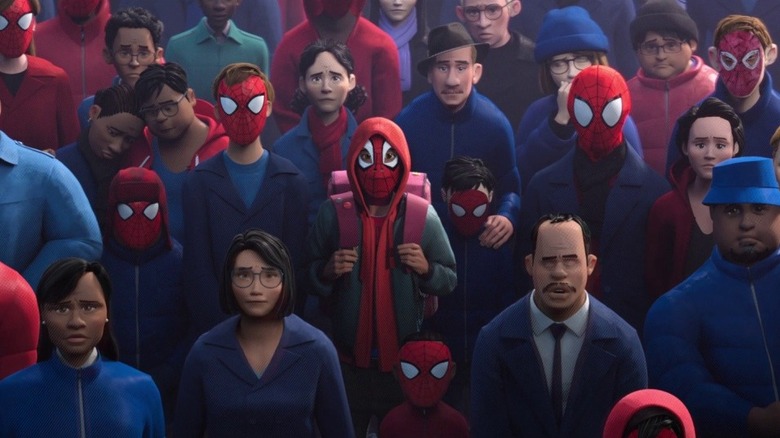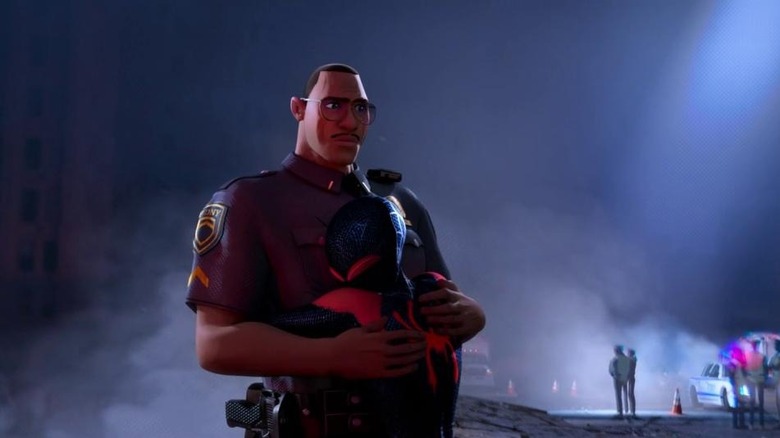Tales From The Box Office: Into The Spider-Verse Gave Spider-Man So Much More Than Just A Hit Movie
(Welcome to Tales from the Box Office, our column that examines box office miracles, disasters, and everything in between, as well as what we can learn from them.)
By the time "Spider-Man: Into the Spider-Verse" hit theaters in 2018, the world had seen an awful lot of the A-list Marvel superheroes on the big screen. Beginning with Sam Raimi's smash hit "Spider-Man" in 2002, Spidey became just about the most bankable movie star on the planet, if we consider the superheroes themselves the movie star (as some of the actors who play these roles have suggested). In any event, the "Spider-Man" movies, covering Tobey Maguire, Andrew Garfield, and Tom Holland, had made nearly $5 billion at the global box office up to that point — not even counting "Avengers: Infinity War," which arrived in 2018 and became a $2 billion global smash.
That being the case, in some ways, it seemed like Sony might be risking a bit of oversaturation when they announced plans for a theatrically released, animated movie centered on the web-slinger. Especially considering that audiences had been treated to a nearly never-ending string of animated "Spider-Man" shows at home on TV between movies. But this was going to be different; this was going to not only give us the Miles Morales version of the hero on the big screen for the first time ever, but the film would break the Marvel multiverse wide open in a way audiences simply weren't prepared for. In short? A masterpiece was on the horizon.
In honor of the release of "Spider-Man: Across the Spider-Verse," we're looking back at "Into the Spider-Verse," how the project was revealed to the world in the worst possible way, how this came to be Miles' big cinematic debut, what happened when the movie was released, and what lessons we can learn from it several years removed. Let's dig in, shall we?
The movie: Spider-Man: Into the Spider-Verse
For a movie that went on to become so roundly beloved, the project that we would eventually come to know as "Spider-Man: Into the Spider-Verse" was revealed in a pretty brutal way. As part of the infamous Sony email hack that leaked a number of projects online well before they were intended, it was disclosed that Phil Lord and Chris Miller, coming hot off of "The LEGO Movie," were developing an "animated Spider-Man comedy" for the studio.
Keep in mind, this was just after "The Amazing Spider-Man 2" came out, with the studio trying to figure out how to make the most of the "Spider-Man" franchise characters it controls. This is when the never-made "Sinister Six" movie came about, for example, just to add some context. Naturally, all of that craziness went away when Sony signed a deal with Disney that brought Spidey into the Marvel Cinematic Universe, with Tom Holland taking over as Peter Parker. Instead of "The Amazing Spider-Man 3," we got "Spider-Man: Homecoming" along with spin-offs outside of the MCU like "Venom."
Sony officially confirmed the mysterious animated "Spider-Man" movie in 2015. Sony Pictures chairman Tom Rothman said that the film will "co-exist" with the live-action Spider-Man universe. "The film will exist independently of the projects in the live-action Spider-Man universe, all of which are continuing," a press release elaborated. This was more of an "in addition to" rather than an "instead of" situation. With Peter Parker in the MCU, Sony was determined to make the most of this franchise, one way or another. That was deeply evident at the time and so much of this felt like squeezing blood from a stone. Let us never forget the Aunt May movie that was floated at Sony. As a result, this animated film initially could have been written off as a cash grab, but Lord and Miller had other ideas.
Miles Morales gets his day in the sun
The big decision that Lord and Miller made in agreeing to take on the project was to center the film on Miles Morales — not Peter Parker. Miles debuted in the pages of Marvel Comics in 2011 and served as Spider-Man in the "Ultimate" universe within the wider multiverse. Created by Brian Michael Bendis and Sara Pichelli, the biracial Black and Puerto Rican iteration of the iconic superhero became sensationally popular surprisingly fast. Naturally, the "Black Spider-Man" angle gained a lot of attraction in the press.
But many readers truly resonated with the character, who had an identity distinct from Peter Parker. This was not merely a retread of the same story, even though it contained familiar echoes. For Lord and Miller, they knew bringing Miles to the masses was the key. Producer Amy Pascal, speaking to Fandango in 2021, explained that this was a condition for them to agree to do the film. She said:
"I approached Chris and Phil about doing the Spider-Verse movies when I was still running Sony, I said, 'Can you guys figure out how to do an animated Spider-Man movie?' And the first thing they said to me was, 'Absolutely, if we do Spider-Verse and we do Miles.' And I'm like, 'Right on.' Because of course, it is in the comics, but nobody could have done it better than them."
At the time, it was important to avoid any brand confusion with general audiences. As a result, there are no big cameos from previous Spider-Men or references to the MCU or anything like that. Co-writer and co-director Rodney Rothman, speaking to ScreenCrush ahead of the movie's release in 2018, explained:
"There were many thoughts about where we could put Tobey Maguire and others. I think after this film, those thoughts might have a little more traction. But before this movie, and introducing the idea of the 'Spider-Verse' to the audience, I think everybody was afraid that it would just really confuse people."
A unique experience
Another key element that helped make "Into the Spider-Verse" work was the fact that it opened up the Marvel multiverse, allowing for Peter Parker, Mary Jane, and other touchstones to enter into the story alongside Miles. Yet, it must be emphasized that the Marvel Cinematic Universe had not gone full multiverse yet — that was still a few years off. So audiences weren't quite used to this sort of thing just yet. Save for what the Arrowverse was doing on The CW, this was kind of uncharted territory outside of the comics. As such, studio executives kindly doubted that it would even work for general moviegoers.
"It is not going to feel like every other Spider-Man movie you've seen," Chrill Miller said to IGN in 2016. "It will stand on its own as a unique filmgoing experience." That related, yes, to the multiverse of it all, but also the look of the film. It wasn't just animation — it was groundbreaking. The film looks and feels more like a comic book than any other superhero movie before it. That was by design. Co-director Bob Persichetti had this to say to Collider in 2017.
"We took a lot of the processes that were 75 years old, and we tried to turn that into a cinematic language. That was the starting point. On top of that, the style of the animation, the way the animation movies — it's still all CG, it's still all computer... it is pretty much 100% CG. But we've learned how to sort of break the machine and create a new pipeline."
Coming down to the wire
The project remained largely mysterious for the first couple of years during its development and production. However, the curtain was pulled back when the title was revealed in December 2017, with an early teaser arriving soon thereafter. The world understood this was going to be a unique experience.
The final look of the film is polished as hell, along with a surprisingly tight, coherent story. It centers on Miles Morales, telling his Spidey origin story, who then meets Peter Parker and realizes that there are many other Spider-People out there, such as Spider-Gwen, Spider-Man Noir, and even Spider-Ham. They have to team up to battle Kingpin (among others) to help keep the multiverse intact. Despite the remarkable finished project, it all actually came down to the wire. Phil Lord, taking to Twitter in 2020, revealed they reworked the entire third act very late in the game.
So here is the "storywheel" of @SpiderVerse . We did a big shakeup of the story less than a year from release and we had to figure out how to reshape sequences we had already boarded and animated and fold them in with new stuff. Oh and we rebroke the whole third act. pic.twitter.com/NYPcaPcXfH
— Phil Lord (@philiplord) March 22, 2020
"So here is the 'storywheel' of @SpiderVerse. We did a big shakeup of the story less than a year from release and we had to figure out how to reshape sequences we had already boarded and animated and fold them in with new stuff. Oh, and we rebroke the whole third act. These dumb whiteboards became our bible. It's less of an outline and more of a triage docket of what we were going to do to each sequence. It made sense basically to no one but us. This is not a flex. This is embarrassing that we hadn't figured it out this late in the process. It's more to illustrate that it IS a process. Always."
Embarrassing though it may be, the film that hit theaters in 2018 was anything but embarrassing. It was a revelation.
The financial journey
Sony moved around the release date a few times before ultimately settling on a pre-Christmas release right at the end of the year in 2018. It was, all things considered, a pretty crowded month but "Spider-Man: Into the Spider-Verse" found a nice little home on December 14, 2018. Fortunately, the film arrived riding a wave of near-universal praise well beyond what anyone was expecting.
The film opened at number one, albeit with a somewhat modest $35.3 million, which is not necessarily a big weekend by superhero movie standards. Sony benefited due to the fact that Universal's "Mortal Engines" tanked that weekend, while Clint Eastwood's "The Mule" settled for number two. Meanwhile, "The Grinch," "Ralph Breaks the Internet," and "Creed II" were starting to run out of gas.
Even with huge competition in the following weeks that included "Aquaman" (the highest-grossing DC movie ever), "Bumblebee," "Mary Poppins Returns," and "Vice," the film directed by trio Bob Persichetti, Rodney Rothman, and Peter Ramsey held strong. Against a very reasonable budget (especially considering how good it looks) of $90 million, the movie finished its run with $190.2 million domestically and $185.3 million internationally for a grand total of $375.5 million worldwide.
Again, that's small relative to other big comic book films, but it was more than enough to justify the investment. Especially considering the sheer critical darling the movie became. It even went on to win the Best Animated Feature Oscar at the Academy Awards, which served as a pretty major surprise. Even if it wasn't the original intention, the success served as an investment in the future, as the audience for the film has grown immeasurably in the handful of years since its original release. It's the kind of win any studio would kill to have. It's a calling card that Sony can point to and say, "We did this and you didn't."
The lessons contained within
It's almost dizzying to try and boil down the miracle that this movie is. It almost defies all logic as we generally understand it when applied to studio franchise filmmaking. Franchise blockbusters simply aren't supposed to be this bold and inventive. Yet, here we are. Nearly five years later, we've got a similarly bold sequel breaking out bigger than the original did at the box office. The fact that "Across the Spider-Verse" will make so much more than its predecessor speaks volumes about what it accomplished.
Sony, in the midst of a sea of potentially awful decisions brewing, somehow put the right people on the right project and didn't get in the way of their bold ideas. What could have been an artistically stale cash grab turned into one of the most roundly-beloved superhero movies ever because Sony let the right people do what they do best.
More than that, Sony now has another gigantic shingle of the "Spider-Man" franchise to hang their hat on. Plus, this movie arguably did more to bolster Spider-Man's profile in a positive way this side of Sam Raimi in 2002. But it's not just Peter Parker: it's a multiverse of possibilities. The world at large now knows Miles Morales (not to mention the likes of Spider-Gwen and Spider-Ham), expanding the scope of what's possible in this universe in the future. It was, perhaps almost by accident, one of the best investments Sony and Marvel could have made in securing a future for Spider-Man for years to come. Does "Spider-Man: No Way Home" even happen the same way without this movie (and make nearly $2 billion at the box office)?
I kindly doubt it.
